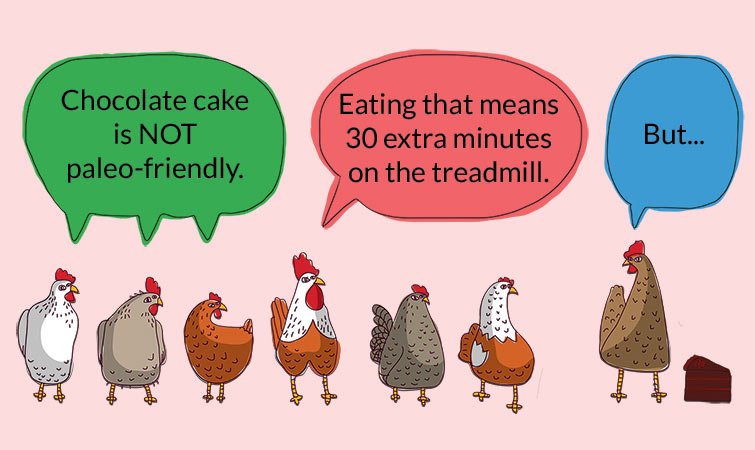Coping when your friends, colleagues, and family are still dieting
Starting down the path towards a non-diet lifestyle is exciting! We can feel excited by the prospects of finally healing from disordered eating, binge eating, and the like. We can feel empowered when we’re at home browsing fat-positive Instagram feeds, reading articles about fat liberating, and practicing self-care activities. But things get much trickier when we interact with others who are not familiar with this approach to food and bodies.
There is no denying it: even though these ideas have become more and more popular, this way of life is still not yet mainstream. While many have caught on that “dieting” is unhealthy, the same people promote “clean eating”, “lifestyle changes”, “eating for leanness”, and about a million other things that are really diets by other names.
As we strive for our own liberation, we remain surrounded by diet culture. We may find enclaves where we are insulated from it, but at the end of the day we still have to go to the office, hang out with friends, have family gatherings, etc. Diet culture is right there waiting for us when we leave our cozy fat positive cocoons.
How’s a person to deal? Try this advice on for size.
Meredith’s Tips for Coping With Diet Talk
1. Make sure you have a strong community backing you up.
At the end of the day, you need to find people who’ve got your back and can reinforce the concepts of fat liberation when your own doubts creep up.
We all have moments of weakness where we see people we know dieting and think, “She’s losing weight! Maybe long-term weight loss is possible after all!” or, “Oh no, I went up a size; maybe I should start restricting my food again!”
The key is to have friends to support you through these moments: to remind you that dieting doesn’t work, and also to remind you of what you’ve gained on your path to fat liberation.
2. Set firm boundaries on diet talk in your relationships.
Diet talk is everywhere. Once you’ve given up dieting, hearing diet talk on a regular basis from family members, friends, or anyone else in your life can be both exasperating and triggering.
Coping with diet talk can be especially hard when you were recently quite happy to participate in it. Particularly when we’re new to fat liberation and Health At Every Size, those around us don’t know it and they go about their normal food- and body-shaming ways.
What’s important to realize is that you have the right to set boundaries in your relationships. In fact, just like good fences make good neighbors, good boundaries make good relationships. Most importantly, you are allowed to change your boundaries at any point in time; just because you were an enthusiastic participant of diet talk in the past doesn’t mean that you have to be going forward.
It can be helpful to put boundaries on diet talk. You may choose to gently tell the other people you are spending time with that you prefer not to discuss food nor bodies. To persuade them, you may choose to tell them the ways in which it hurts you hear diet talk. It’s equally valid to ask for the boundary without giving an explanation.
You may have to remind them of your boundary, or help them understand all that constitutes diet talk. Diet talk is so common that sometimes we don’t even realize we’re participating in it. Trust that if they care about you they will practice making this change.
3. After putting the kibosh on diet talk, decide whether you want to educate people on alternatives.
After putting a firm boundary up wherever it needs to be to protect you from triggering diet talk, you’re now free to decide how far you want to go in explaining yourself to the people you spend time with. Again, it’s important to realize that you have the right to not say a word about your new journey.
On the other hand, there may be people that you actually want to introduce to your new mindset. Before those encounters, consider how much effort you want to put into educating others, and how much pushback you’re willing to brook. Then, for your own emotional health, be prepared to step away if things go past the limits you’ve set.
If you do want to introduce certain people to your new way of thinking, scroll down to the second part of this article.
4. Consider avoidance on social media.
While it is probably not possible for you to avoid your dieting mother-in-law or restriction-obsessed coworker entirely, it could be possible for you to avoid them on Facebook, even if it’s just for a short while.
What would it feel like to unfollow certain friends or family who post diet-y things that you see on social media? They would never have to know.
5. Emotionally prepare yourself for encounters with people promoting diet culture.
Before you meet with people whose discussions you might find triggering, consider creating an energetic boundary around yourself.
I like to do this by picturing a giant bubble around me. I use my creativity to design the bubble to look however I want in the moment. Sometimes it’s iridescent purple, other times it’s gold. Visualize this bubble as your protector when you’re in diet talk situations. You don’t have to let any of that energy in; your bubble can protect you.
I know this can sound a little “woo”, but this exercise is really about reminding yourself to be mindful in the moment and that you don’t have to take everything that others are giving to you.
Breathing exercises and sending yourself self compassion can also help.
What if I want to convince others to stop dieting?
When we love people and see them going down a path that we fear might be harmful to them, it’s really hard to do nothing.
On the other hand, diet culture is so ubiquitous and its beliefs are so strongly engrained in us that we often need to be at our wit’s end in order to be open to such radical ideas as not counting calories or categorizing foods as “clean” and “unclean”.
Here are some thoughts to consider before you try to introduce others to this philosophy.
1. Realize that, without even trying, you are an embodiment of this work.
I’ve noticed something: when people start to do this work, they start to glow.
At the beginning of my fat liberation work, I had untold people tell me that something really seemed to have shifted in me, and that they could see it in the way I held myself and interacted with others. And I in turn saw similar changes in my friends.
When someone starts to believe in themselves, accept their body size and shape, and trust in their body’s signals and desires — it shows.
Consider having faith in these subtle messages you’re sending. Even when you’re not explicitly advocating for this lifestyle in a conversation, you implicitly are through your embodiment of this work.
2. Remember it is your prerogative to not try to convince someone.
You only have to change hearts and minds if and when you want to. You can absolutely put all of this aside and stay quiet when people are discussing food rules at work, for instance. You do not have a responsibility to educate everyone on these topics. It is an option you have available to you, and that’s all.
I suggest only thinking about introducing others to these ideas once you’re feeling on firm ground yourself. Be patient, and know that you have the rest of your life to spread this message if and when you feel comfortable.
3. Think of it as planting seeds.
If you do try to introduce people to these ideas, remember that you are unlikely to convince someone to give up on diet culture and accept fat people in one short conversation. We have all been living in this culture for years and years, so it’s only natural for people to have doubts and skepticism at first.
As you introduce someone to these concepts, think of yourself as planting little seeds. Those seeds may not sprout immediately, but they could germinate when you least expect them to.


